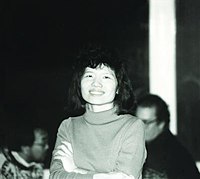
Back فان تشونغ Arabic فان تشونج ARZ فن چانق AZB Fan Chung Welsh Fan Chung German Fan Chung Spanish فن چانگ Persian Fan Chung French פאן צ'ונג גרהאם HE Fan Chung HT
Fan Chung | |
|---|---|
金芳蓉 | |
 Fan Chung in 1987 | |
| Born | October 9, 1949 |
| Nationality | American |
| Alma mater | National Taiwan University (BS) University of Pennsylvania (MS, PhD) |
| Known for | Spectral graph theory extremal graph theory Random graphs |
| Spouse | |
| Scientific career | |
| Fields | Mathematics |
| Institutions | University of Pennsylvania University of California, San Diego |
| Doctoral advisor | Herbert Wilf |
| Doctoral students | Steve Butler Sinan Aksoy Josh Tobin Olivia Simpson Mark Kempton Franklin Kenter Jake Hughes Mary Radcliffe Wenbo Zhao Alexander Tsiatas Shoaib Jamall Paul Horn Reid Andersen Ross Richardson Joshua Cooper Robert Ellis Lincoln Linyuan Lu Chao Yang |
Fan-Rong King Chung Graham (Chinese: 金芳蓉; pinyin: Jīn Fāngróng; born October 9, 1949), known professionally as Fan Chung, is a Taiwanese-born American mathematician who works mainly in the areas of spectral graph theory, extremal graph theory and random graphs, in particular in generalizing the Erdős–Rényi model for graphs with general degree distribution (including power-law graphs in the study of large information networks).
Since 1998, Chung has been the Paul Erdős Professor in Combinatorics at the University of California, San Diego (UCSD). She received her doctorate from the University of Pennsylvania in 1974, under the direction of Herbert Wilf. After working at Bell Laboratories and Bellcore for nineteen years, she joined the faculty of the University of Pennsylvania as the first female tenured professor in mathematics. She serves on the editorial boards of more than a dozen international journals. Since 2003 she has been the editor-in-chief of Internet Mathematics. She has been invited to give lectures at many conferences, including the International Congress of Mathematicians in 1994 and a plenary lecture on the mathematics of PageRank at the 2008 Annual meeting of the American Mathematical Society. She was selected to be a Noether Lecturer in 2009. In 2024, she was elected to the United States National Academy of Sciences.[1]